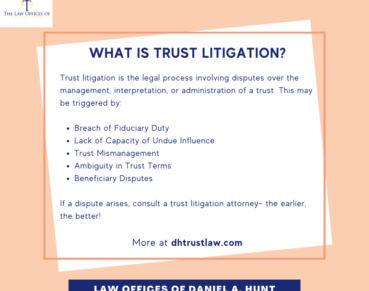How to Stop the Sale of California Real Property

In estate and trust administrations, the conflict often involves or centers on real estate. Many beneficiaries want to know how to stop the sale of California real property. In order to temporarily stop the sale of California real property, you may wish to file a Lis Pendens, or Notice of Pendency of Action. Attorneys use a Lis Pendens to secure a beneficiary’s interest in a piece of real estate during a trust or estate dispute.
What is a Lis Pendens?
In Latin, Lis Pendens translates to “suit pending”. A Lis Pendens, or Notice of Pendency of Action, is a written document that informs the public that a lawsuit is attached to the title on that property.
A Lis Pendens isn’t a lien and cannot technically prevent the sale of real property. But it’s an effective deterrent to potential buyers because it throws that property’s ownership rights into question.
How to File a Lis Pendens
The California Code of Civil Procedure outlines the legal requirements to file a Lis Pendens in California. Here are some of the main requirements.
- In order to file a Lis Pendens, there must be an active lawsuit in which you have made a real estate claim. You cannot file a Lis Pendens as a stand-alone document. This must be recorded in the county where the real property is located.
- Before it can be recorded, a Lis Pendens must be mailed by Certified mail to the required parties (anyone with an adverse claim to the property you are seeking). You’ll need to attach proper proof of service to your notice, demonstrating that this has been done.
- After the Lis Pendens is recorded with the County Recorder, you must send a Notice of Lis Pendens to the parties and file this with the court where your lawsuit is pending.
How to Expunge a Lis Pendens
Under California Code of Civil Procedures, any party (or nonparty with an interest in the real estate in question) can bring a Motion to Expunge Lis Pendens before the court. The claimant has the burden of proof.
Why would a court choose to expunge a Lis Pendens? Here are 3 common reasons:
- The claimant has not made a real property claim in an underlying lawsuit.
- The court decides that the claimant’s real property interest can be adequately protected by posting a bond or undertaking.
- Errors were made in serving and filing the Lis Pendens.
Never File a Frivolous Lis Pendens
A Lis Pendens should never be filed frivolously. If you file a Notice that is later expunged, you may be liable for the costs associated with having it expunged and any losses that were experienced due to the cloud on the title.
The California Civil Code of Civil Procedures states that the court shall award the prevailing party with reasonable attorney fees and costs of making or opposing the motion, “unless the court finds that the other party acted with substantial justification or that other circumstances make the imposition of attorney fees and costs unjust.”
Alternatively, the property owner may be able to force you to post a bond in order to keep the Lis Pendens recorded.
Case Study: How We Stopped a Real Property Sale
Here’s a case study showing how our firm used a Lis Pendens to protect one client. A mother died, leaving behind two daughters. Daughter #1 had financially lived off of her mother for her entire adult life. She personally drafted a series of amendments disinheriting her sister, Daughter #2, and had her mother sign them.
After the mother died, Daughter #1 told her sister that nothing was left to her, refusing to even provide a copy of the trust. Daughter #2 was frustrated, but not too concerned – until Daughter #1 listed her mother’s house, the trust’s main asset, for sale. At that point, Daughter #2 hired our firm to represent her interests.
Our legal team immediately filed a Petition with the court. We filed and served a Lis Pendens on Daughter #1. Upon recording the Lis Pendens, we discovered that the property had been days away from closing on a sale.
Thanks to the efficient action we took, we successfully preserved our client’s claim to the property. We reached a settlement with Daughter #1, permitting the sale to go through and the proceeds to be divided between the sisters.
If you think a Lis Pendens might be appropriate for your situation, we recommend you seek the advice of an experienced trust/estate litigation attorney to assist you. Feel free to contact our law firm if you have any questions.
Law Offices of Daniel A. Hunt
The Law Offices of Daniel A. Hunt is a California law firm specializing in Estate Planning; Trust Administration & Litigation; Probate; and Conservatorships. We've helped over 10,000 clients find peace of mind. We serve clients throughout the greater Sacramento region and the state of California.




